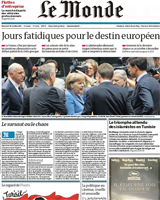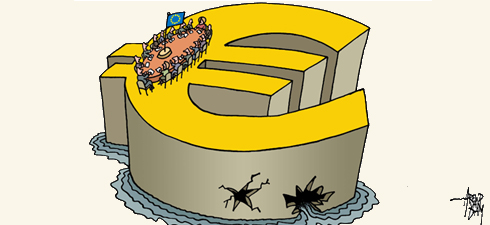 "Whenever Europe has moved forward it was during a crisis. The more it was serious, the more progress in the construction of Europe was major. So, today, there is every reason to hope [...] Given the current clash, Europe is ready to take a great leap forward". Presented a few days ago to a roomful of French and German business executives, this analysis by Joschka Fischer, (Green Party ) Germany's former Minister of Foreign Affairs, could seem optimistic.
"Whenever Europe has moved forward it was during a crisis. The more it was serious, the more progress in the construction of Europe was major. So, today, there is every reason to hope [...] Given the current clash, Europe is ready to take a great leap forward". Presented a few days ago to a roomful of French and German business executives, this analysis by Joschka Fischer, (Green Party ) Germany's former Minister of Foreign Affairs, could seem optimistic.
But nothing is preordained in this field. The European crisis is serious, the most serious since the end of World War II. It is economic and social – the recession threatens – but not only. It is also deeply political, as shown by the movements of defiance – or revolt – with their comments about the "Old Continent". This debt crisis can bring Europe to chaos.
Faced with this threat, the months-long negotiations between first Paris and Berlin, then with the other countries of the eurozone, then finally the rest of the Union, are pitiful. There were a slew of one-on-one meetings, standoffs, summits, procrastinating, skimping and postponing.
Fresh air needed
They will manage, no doubt (mustn't upset the markets), this October 26, in Brussels, to find a new last ditch agreement, an umpteenth compromise. They will have done makeshift repairs to the house – by imposing a severe austerity cure on distraught peoples, by forcing lenders to give up part of what is due to them and by demanding a recapitalisation of the banks. Thus, the size of the fire hose is increased. With all that it has still not put out the fire. And that is what is a cause for concern.
Europe needs a breath of fresh air as well as willing and ambitious architects. It is, of course, urgent to save the euro. The founders of the single currency perhaps over-sold it to their public opinion, by presenting it as the absolute key to well-being. Which it is not. It is, however, a condition for well-being. Beyond that, it is the manner in which Europe functions; the way it is organised; and it is the solidarity it requires among member states that should be reconsidered.
We tend to forget, in these times in which the hardships of each individual favours the selfishness of all, that the world being constructed will be formed of large groups – around the United States and China, in particular. That is where the fire is. We have to put out the fire while at the same time rebuilding the house. This is an emergency.
Translated from the French by Pat Brett
Was this article useful? If so we are delighted!
It is freely available because we believe that the right to free and independent information is essential for democracy. But this right is not guaranteed forever, and independence comes at a cost. We need your support in order to continue publishing independent, multilingual news for all Europeans.
Discover our subscription offers and their exclusive benefits and become a member of our community now!












